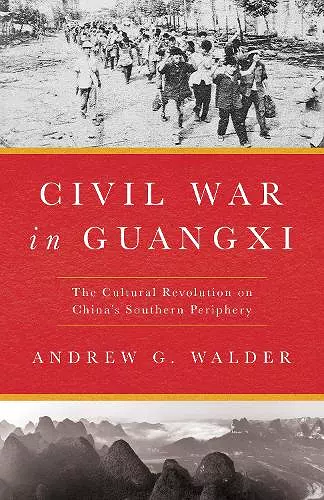Civil War in Guangxi
The Cultural Revolution on China's Southern Periphery
Format:Paperback
Publisher:Stanford University Press
Published:28th Mar '23
Should be back in stock very soon
This paperback is available in another edition too:
- Hardback£77.00(9781503634671)

Guangxi, a region on China's southern border with Vietnam, has a large population of ethnic minorities and a history of rebellion and intergroup conflict. In the summer of 1968, during the high tide of the Cultural Revolution, it became notorious as the site of the most severe and extensive violence observed anywhere in China during that period of upheaval. Several cities saw urban combat resembling civil war, while waves of mass killings in rural communities generated enormous death tolls. More than one hundred thousand died in a few short months.
These events have been chronicled in sensational accounts that include horrific descriptions of gruesome murders, sexual violence, and even cannibalism. Only recently have scholars tried to explain why Guangxi was so much more violent than other regions. With evidence from a vast collection of classified materials compiled during an investigation by the Chinese government in the 1980s, this book reconsiders explanations that draw parallels with ethnic cleansing in Rwanda, Bosnia, and other settings. It reveals mass killings as the byproduct of an intense top-down mobilization of rural militia against a stubborn factional insurgency, resembling brutal counterinsurgency campaigns in a variety of settings. Moving methodically through the evidence, Andrew Walder provides a groundbreaking new analysis of one the most shocking chapters of the Cultural Revolution.
"The world's leading expert on China's Cultural Revolution has written another breathtaking book. By examining one of the darkest episodes of human history, Andrew Walder not only provides a new explanation for conflict in China but also advances general theories on violence during civil war."—Yuhua Wang, author of The Rise and Fall of Imperial China
"This important and unsettling study of the Cultural Revolution in Guangxi lays bare the dark side of China's authoritarian political system. Through careful analysis of newly available primary sources, Walder convincingly connects the horrific violence of that time and place not to ideological or ethnic differences, but to military-civilian factionalism that permeated all levels of government. A party-state known for exerting control, when pressed, could spawn untold conflict and cruelty."—Elizabeth J. Perry, Harvard University
"Andrew Walder is one of the world's most distinguished analysts of the Chinese Cultural Revolution and his new book breaks apart numerous myths. Drawing on extraordinarily rich sources from Guangxi province, Walder shows that violence tore apart the countryside as well as the city, and that factionalism could give way to deeper splits within the party. Above all, he adds analysis of ethnic division to our knowledge of this period. This is disturbing, field-making reading."—Rana Mitter, Oxford University
"This work is yet another vital contribution to the study of the Cultural Revolution by the sociologist Andrew Walder.... It will be essential reading for scholars of the People's Republic and an accessible source, for informed lay readers and students, on the horrors of the Cultural Revolution."—Donald S. Sutton, China Quarterly
"What is unique about Civil War in Guangxi... is its refreshing emphasis on the geopolitical dimension of the Cultural Revolution's complex twists and turns, concretely tying the tragic unfolding of political processes in China to the war operation in Vietnam. As such, this book is not only of pivotal interest to scholars of collective mobilization, political violence, and Chinese communism, but also firmly places itself in conversation with global and transnational sociology and scholarship on the US empire in the post-war era."—Yueran Zhang, Social Forces
"This is an excellent illustration of sociological study, using newer ideas of analyzing the data in such a way that contextualizes the information provided in the sources. Essential."—K. Lynass, CHOICE
"Cutting through the complexity of events, Walder's theory identifies forces that tie together the dynamics of the Cultural Revolution throughout the province. I am not aware of other analyses about Maoist movements which connect with such precision disparate events in towns and villages to events at higher levels of the state."—Daniel Koss, Pacific Affairs
"Walder convincingly demonstrates that it is of crucial importance to take the specific chains of events into account in order to understand both the rise of factionalism and the patterns of political violence in Guangxi. Based on this largely historical approach, in combination with state-of-the-art statistical analysis and painstaking empirical detail, Andrew Walder has been able to significantly advance our understanding of why political violence in Guangxi came to be so much more intense than in most other Chinese regions."—Daniel Leese, International Review of Social History
"Enriched with a wealth of fresh data and evidence, Walder's book substantially enhances readers' comprehension of the intricacies of political violence in modern Chinese history. It also makes a substantial and pertinent contribution to the broader dialogues encompassing political sociology and contentious politics."—Fei Yan, Contemporary Sociology
"The book furnishes a rich, multilayered, and event-based account of politics and governance (or the lack of it) in Guangxi during the Cultural Revolution."—Eddy U, International Sociology
"Civil War in Guangxi adds yet another important chapter to the narrative history of China's Cultural Revolution decade.... [A] new generation of scholars and students will have access to a valuable resource in Civil War in Guangxi, one that can teach lessons on how moments of intense political unrest can unleash the most horrid of inhuman tendencies in a society."—James J. Hudson, Twentieth-Century China
ISBN: 9781503635227
Dimensions: unknown
Weight: unknown
296 pages